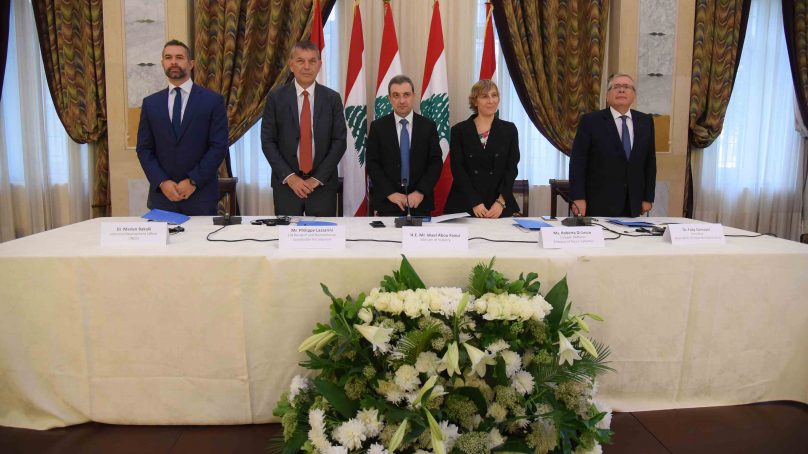
The key contribution that Lebanon’s agro-food industry makes to the broader economy and the steps that need to be taken to position it for a successful and sustainable future were explored at a sectoral conference, which took place at the Grand Serail in Beirut. Titled ‘Supporting Agro-industries: A Fundamental Choice for a Better Future’, the event was held under the patronage and in the presence of the Minister of Industry H.E. Wael Abou Faour and marked a joint initiative for the Ministry, the Italian Embassy in Lebanon and the United Nations Industrial Development Organization (UNIDO).
Participants to the opening session included Philippe Lazzarini, the UN Resident and Humanitarian Coordinator for Lebanon; Roberta Di Lecce, Chargée D’affaires at the Embassy of Italy in Lebanon; Dr. Bassel El Khatib, Chief of Arab Regional Division at UNIDO represented by Dr. Marlen Bakalli, Industrial Development Officer at UNIDO HQs and project manager and Dr. Fadi Gemayel, President of the Association of Lebanese Industrialists (ALI).
In his speech, Minister Abou Faour said, “I thank the stakeholders for the joint efforts to develop the agro-industry sector in Lebanon. This is an important sector that has accounted for 23.7% of industrial exports in 2017. Its contribution decreased to 21.11% in 2018 and to 20.53% in the first six months of the current year. The sector generated $287 million in the first six months of 2017, $267 million in the same period of 2018 and $266.8 million in the same period of 2019. This decline is in contradiction with the 12.1% increase in industrial exports in the first six months of 2019 in comparison with 2018. I am well aware that the political and social situation in the country is clouded by worry and tainted with pessimism. For this reason, good news is more than welcome. Furthermore, exports increased by 12% during the first six months of 2019 compared to last year and this has a positive impact on the overall economy. Exports also increased by 24.6% between 2016 and 2019. This means that the economy can recover if the right mechanisms to promote productive sectors are adopted.” He concluded by thanking those who have supported this project saying, “I hope it will allow us to improve and develop this sector, including olive oil and other products in which farmers are still using primitive methods, making them inappropriate for exports and competition abroad.”
Philippe Lazzarini commented saying, “Lebanese industry can compete regionally and internationally. In a context of growing economic challenges, bold actions are needed to address challenges facing the sector and to progress according to current global technological developments and standards.”
Roberta Di Lecce declared, “The Italian aid policy in Lebanon has a clear priority in supporting the productive sectors of the economy, focusing on the creation of employment opportunities and on enhancing those areas where Lebanon has a comparative advantage. Agro-industry is certainly one of them. The Italian Agency for Development Cooperation and the Italian enterprises are committed to providing know-how and technological support to the development of the sector.”
Dr. Marlen Bakalli explained, “UNIDO is honored to support the launch of a roadmap for the agro-food sector in Lebanon. We have supported the development of ISID in Lebanon through our Country Program and expect this roadmap to play an instrumental role strengthening our partnership with the Government of Lebanon.”
According to Dr. Fady Gemayel, “The agro-food industry plays an important and strategic role in the Lebanese industry as agro-industries account for 23% of total Lebanese exports and the sector employs around 33% of the Lebanese labor force and encompasses the largest number of Lebanese factories. It is a primary sector that links agriculture to the industrial sector. We need cross-sectoral collaboration to increase the added value of products from the traditional agricultural sector and link them to agro-industries after highlighting their potential, importance and market demand for such products by giving them their own identity through AOC labels. Oils and apples from Mount Lebanon are a good case in point. On a different note, I think we should consider the usefulness of adopting organic farming and industrial systems and I hope for further cooperation between Italian and Lebanese institutions, in particular in the agro-food sector.”
The conference served as a platform for the launch of a new agro-food roadmap for Lebanon, which has been developed as part of a broader UNIDO initiative organized under the banner ‘Strengthening job creation and creativity in the agro-food sector in Lebanon through technology transfer and skills training’.
Senior representatives from the public and private sectors and international communities came together for the event, which included presentations and lively debates on topical industry issues. The morning’s activities featured two panel sessions on the themes ‘Agro-industry development: Key engine for economic growth’, and ‘Greening the agro-industrial sector in Lebanon: A must for its sustainability’.
High on the agenda was the vital role played by the UN in supporting private-sector players and the untapped opportunities for innovation in the agro-food sector. The conference also examined the challenges that the sector faces, while looking at ways to develop it and unleash its growth potential. Key themes explored included using design as a tool for Development (D for D) and the need to incorporate ‘greener’ elements across the agro-industrial sector.
The conference was organized by the Ministry of Industry and UNIDO’s office in Beirut. UNIDO has been supporting the agro-industrial sector through the Community Empowerment and Livelihoods Enhancement Project (CELEP) since 2011. An Italian-funded initiative, CELEP provides technical assistance to micro, small and medium-sized enterprises and agricultural cooperatives in various ways, including: upgrading and improving their operational processes; helping them to source new clients; creating better working environments; introducing innovation and creativity; and upskilling workers and boosting their capacity levels.
unido.org
Add to Favorites 















